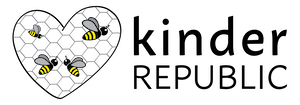Why are you called Kinder Republic?
Because children (Kinder in German, pronounced /ˈkɪndə/ like in kindergarten) direct their education, both individual choices (“what do I want to do?”) as well as governance decisions (e.g. “what shall we put on the schedule?", "what rules do we want to have?", "how do we deal with infractions?" and "what shall we spend money on?”) in the school parliament.
It can also be read as creating a “more kind republic”, which goes well with our vision of Education for a kinder world.
How can my child transition to Higher Education from Kinder Republic?
What we have seen in similar schools around the world, is that if children decide to pursue Higher Education opportunities that are gated by Exams, they prepare for those exams (using a variety of approaches, possibly even including tutors) much like students in conventional schools prepare for exams, and sit for them.
They may also use other methods (e.g. a portfolio of their work) to gain entry to higher education.
How do you support children to transition from Conventional Schools?
The general norm in Democratic/Self-Directed Education is that a child needs to "deschool" for 1 month for every year of completed conventional education. During that time, the community (children as well as adults) support them to understand their rights and responsibilities as citizens of Kinder Republic.
I'm worried that my child would just play all day
In conventional education, play is seen as a recreational activity that is distinct from learning (read more about how that distinction appeared here). When play-time is constrained (as it normally is for children in conventional schools) children try to play at every opportunity they get, and would indeed "play all day" if adults did not impose on their time (e.g. "have you done your homework?"). We do not consider "play" and "learning" to be distinct: a proposal to put Hide & Seek on the schedule is no different to putting Language or Cooking on the schedule. In a sense they do "play all day" but that doesn't mean they are absconding from learning.
Can my child transfer back to a Conventional School?
It is usually very distressing for a child who has experienced the freedom of Democratic education (e.g. where they know that no one can force them to do something that they don't wish to do, where they are respected as equals, where their choices are not judged, where they could even "play all day" without needing to provide any justification of "how it supports their learning", etc.) and appreciated the benefits of Restorative Practices over Retributive Justice to adjust back to conventional school environments. While it is not impossible, our general advice to parents is to not enrol unless they are fully convinced about Democratic Education.
What is the difference between Progressive Education and Democratic Education?
In our usage of the terms, Progressive Education is adult-directed (although with greater autonomy for children than in conventional schools) while Democratic Education is child-directed. If you wish you to learn about the distinction in more detail, please see Differences Between Self-Directed and Progressive Education (Dr. Peter Gray, 2017) and Progressive Education is the Opium of the Educators (Prof. Eugene Matusov, 2021)
However, there is no authority that determines whether a school is Democratic or not, so any school could self-identify as democratic, much like Communist East Germany called itself the German Democratic Republic.
